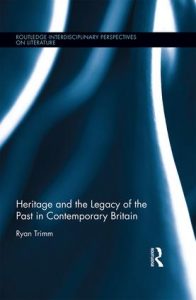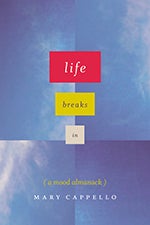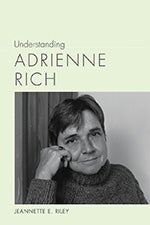Professor Faflik: Melville and the Question of meaning (Routledge, 2018)
This rich volume of essays restores meaning itself as the focal point of one of our most thoughtful modern writers, Herman Melville. Melville and the Question of Meaning thinks about thinking in Melville.
Professor Trimm: Heritage and the Legacy of the Past in Contemporary Britain (Routledge, 2017)

Bringing together heritage studies and literary studies, Heritage and the Legacy of the Past in Contemporary Britain examines heritage as a ubiquitous trope in contemporary Britain, a seemingly inescapable figure for relations to the past. Inheritance has been an important metaphor for characterizing cultural and political traditions since the 1970s, but one criticized for its conservatism and apparent disinheritance of “new” Britons.
Professor Cappello: Life Breaks In: A Mood Almanack (University of Chicago, 2016)

Some books start at point A, take you by the hand, and carefully walk you to point B, and on and on. Life Breaks In: A Mood Almanack is not one of those books. This book is about mood, and how it works in and with us as complicated, imperfectly self-knowing beings existing in a world that impinges and infringes on us, but also regularly suffuses us with beauty and joy and wonder.
Dean Riley: Understanding Adrienne Rich (University of South Carolina (2016)

Among the most celebrated American poets of the past half century, Adrienne Rich was the recipient of awards ranging from the Bollingen Prize, to the National Book Award, to the Lannan Lifetime Achievement Award. In Understanding Adrienne Rich, Jeannette E. Riley assesses the full scope of Rich’s long career from 1957 to her death in 2012 through a chronological exploration of her poetry and prose.
Professor Betensky: The Mysteries of Paris
(Penguin Classics, 2015)
 The Mysteries of Paris is doubtless one of the most entertaining and influential works to emerge from the nineteenth century. It was one of France’s first serial novels and Parisians rushed in droves to the newsstands each week for the latest installment. Eugene Sue’s intricate melodrama unfolds around the story of Rodolphe, a magnetic hero of noble heart and shadowy origins, garnering wild popularity and inspiring a raft of successors, including Les Miserables and The Count of Monte Cristo.
The Mysteries of Paris is doubtless one of the most entertaining and influential works to emerge from the nineteenth century. It was one of France’s first serial novels and Parisians rushed in droves to the newsstands each week for the latest installment. Eugene Sue’s intricate melodrama unfolds around the story of Rodolphe, a magnetic hero of noble heart and shadowy origins, garnering wild popularity and inspiring a raft of successors, including Les Miserables and The Count of Monte Cristo.
Professor Mandel: Disappear Here
(Ohio State University Press, 2015)
 Generation X, comprised of people born between 1960 and 1980, is a generation with no Great War or Depression to define it. Dismissed as apathetic slackers and detached losers, Xers have a striking disregard for the causes and isms that defined their Boomer parents. In Disappear Here: Violence After Generation X, Naomi Mandel argues that this characterization of Generation X can be traced back to changing experiences and representations of violence in the late twentieth century.
Generation X, comprised of people born between 1960 and 1980, is a generation with no Great War or Depression to define it. Dismissed as apathetic slackers and detached losers, Xers have a striking disregard for the causes and isms that defined their Boomer parents. In Disappear Here: Violence After Generation X, Naomi Mandel argues that this characterization of Generation X can be traced back to changing experiences and representations of violence in the late twentieth century.
Professor Nikitas: Extra Life (Polis Books, 2015)
 The first Young Adult novel, a mind-bending and time-bending thriller, from acclaimed author Derek Nikitas. “With Extra Life, Derek Nikitas gives us a weird-science thriller packed with inventive twists, dynamic action and characters we both care about and genuinely fear. Deeply satisfying.” – Jonathan Maberry, New York Times bestselling author of Rot & Ruin.
The first Young Adult novel, a mind-bending and time-bending thriller, from acclaimed author Derek Nikitas. “With Extra Life, Derek Nikitas gives us a weird-science thriller packed with inventive twists, dynamic action and characters we both care about and genuinely fear. Deeply satisfying.” – Jonathan Maberry, New York Times bestselling author of Rot & Ruin.
Professor Eron: Inspiration in the Age of Enlightenment (University of Delaware Press, 2014)
 Inspiration in the Age of Enlightenment reconsiders theories poetic authority to argue that the Augustan age created a new form of inspiration, one that crucially contributed to defining the movement of secularization in literature from the Renaissance to Romanticism. Seeking to redefine what we mean by secularization in the early stages of modernity, Eron argues that secularization’s link to enthusiasm, or inspiration, often associated with Romanticism, begins in the imaginative literature of the early eighteenth century.
Inspiration in the Age of Enlightenment reconsiders theories poetic authority to argue that the Augustan age created a new form of inspiration, one that crucially contributed to defining the movement of secularization in literature from the Renaissance to Romanticism. Seeking to redefine what we mean by secularization in the early stages of modernity, Eron argues that secularization’s link to enthusiasm, or inspiration, often associated with Romanticism, begins in the imaginative literature of the early eighteenth century.
